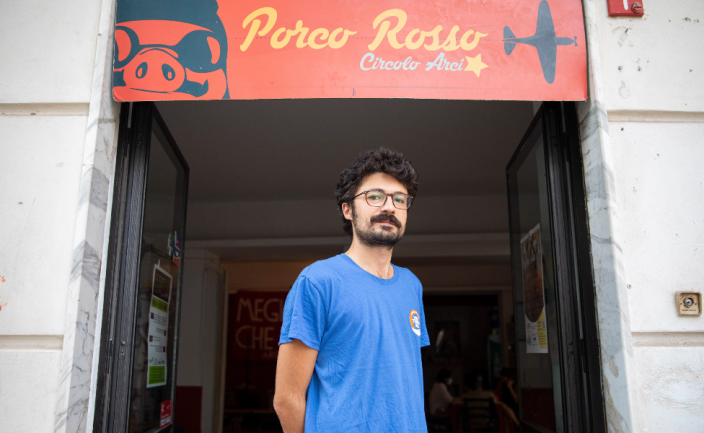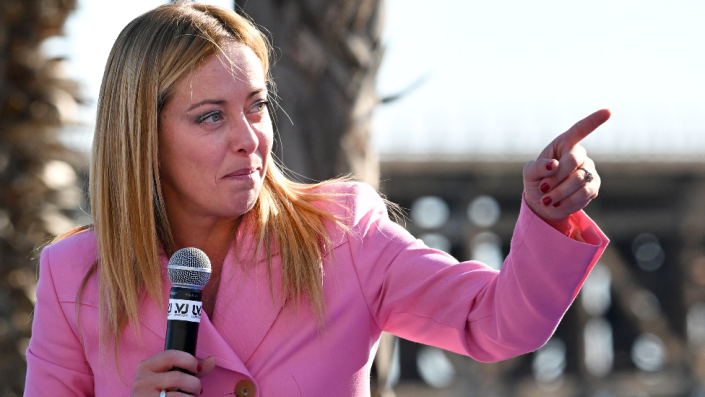
In our series of letters from African journalists, Ismail Einashe meets migrants on the Italian island of Sicily concerned about the political direction of the incoming government.


Giorgia Meloni is about to make history to become Italy’s first female prime minister – and will lead what will be the country’s most right-wing government since World War Two.
Her far-right Brothers of Italy party is a part of a coalition that has made reducing immigration a key part of their agenda.
For African migrants like Mustapha Jarjou in Palermo, the capital of Sicily, it heralds frightening times ahead: “I am very worried it’s going to create a lot of negative impact on the lives of migrants like me.”
The 24 year old, who is a spokesperson for the Gambian Community Association in Palermo, says the policy might fan divisions and hatred towards migrants.
He cites the murder in daylight of the disabled Nigerian street vendor, Alika Ogorchukwu, on the mainland in August as an example.
Italy is one of the main entry points into Europe and since the start of the year 70,000 migrants have arrived on boats on the country’s shores.
Ms Meloni wants to tighten the system for asylum seekers to choke off this irregular migration, which she says threatens the security and quality of life of its citizens.
She also wants to increase repatriations, target charity ships that rescue migrants who get into trouble during the Mediterranean crossing and has called for a naval blockade of North Africa.
Mr Jarjou’s journey to Italy – like that of many others – was incredibly dangerous.
He arrived here aged 17 in December 2016 having left his home in West Africa in search of a better life.
It is a miracle he made it – after leaving The Gambia and getting to Libya, his nightmare began as he was held there in prison on three occasions, each time managing to escape.
He survived a terrifying sea crossing on a dinghy before landing in Sicily, only to end up working as a farm labourer for very low pay in terrible conditions growing watermelons and tomatoes on the island’s hinterlands.
But his fortunes changed when he was issued with official documents, which he had applied for as an asylum seeker. This allowed him to move to Palermo to pursue his education.


He is currently in the second year of his nursing degree and hopes to work in a hospital in the city when he graduates.
If Ms Meloni makes good on her promises, it will be more difficult for migrants to make their status official.
“Documents are an important gateway into integration,” Mr Jarjou says – adding that without them many migrants will simply become “invisible” and be forced to eke out a bleak existence on the margins of Italian society.
He is especially worried about the threats to make it tougher for migrants to make sea crossings by criminalising charity rescue ships. This would simply lead to more deaths in the Mediterranean, he says.
‘World’s largest cemetery’
But the migrants have a powerful ally in Pope Francis, who in a speech at St Peter’s Square in the Vatican last weekend gave a passionate defence of them.
Although the pontiff did not mention Italy by name, his intervention could be seen as a rebuke of the incoming coalition’s policies.
He said the exclusion of migrants was “scandalous, disgusting and sinful”, dubbing the Mediterranean “the world’s largest cemetery” in reference to the thousands of migrants who have perished in its waters over the last few years.
“It is criminal not to open doors to those who are needy,” he said.
Despite Mr Jarjou’s fears, the city of Palermo has a long-standing reputation for being welcoming to migrants.


Situated as it is on the edge of Europe, the city became a cultural melting pot in ancient times, and one of its patron saints is Saint Benedict the Moor, the first black saint in history.
Fausto Melluso, the head of Arci Palermo, an umbrella association for 16 community groups in the city that represents 7,000 members, points out that most people in Sicily and southern Italy did not vote for Ms Meloni or vote at all. Many backed the populist Five Star Movement, led by former Prime Minister Giuseppe Conte.
Until recently an independent left-wing politician in the Palermo municipality, Mr Melluso admits he too is worried about the anti-migrant positions Ms Meloni may pursue.
He says her victory should be a “wake-up call” to challenge such attitudes and instead focus on integrating migrants into Italian society.


A 23-year-old Guinean migrant I met in the city is anxious to leave before life becomes even more difficult.
Having lived in Palermo since the age of 17, he has struggled to sort out his documents and believes Italy’s asylum system already makes it hard for migrants to integrate, often leaving them in limbo.
He speaks fluent Italian, volunteers for community groups, studies and also works as a waiter yet continually faces an uphill battle.
Every two years he has to renew his documents, which takes up a lot of time and is a tough process for migrants.
He is about to give up his job and move to France, where he has relatives and wants to go to university – though he does not know what he will do once his Italian documents expire next year.
“After six years here, nothing has changed for me. I feel like I arrived yesterday.”
More Letters from Africa:
Follow us on Twitter @BBCAfrica, on Facebook at BBC Africa or on Instagram at bbcafrica






